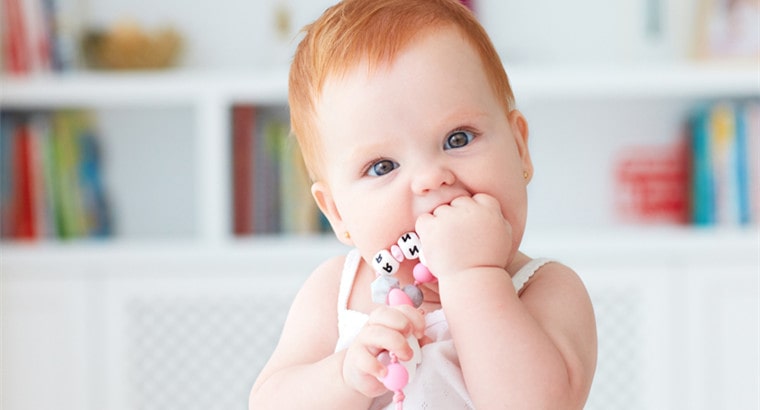Do you suspect your child is grinding their teeth while sleeping? Perhaps you heard the grinding or clicking sound, or you noticed their mouth constantly moving. Teeth grinding, otherwise known as bruxism, can happen to children and adults alike for various reasons. University of Michigan Health System states that even six-month-old babies can begin to grind their teeth.
But why do toddlers grind their teeth? Is it bad for their teeth, and when should you consult a doctor? And most importantly, what can you do to help them stop? Let’s find out!
Why Do Toddlers Grind Their Teeth?

Adults usually start grinding their teeth during a particularly stressful period or when they feel nervous. On the other hand, children can do it for various reasons, and not all of them are so dramatic.
In fact, Nemours Foundation estimates that two or three out of every ten kids clench or grind their teeth. They mostly do it in their sleep, but it can happen while they are awake, as well. Also, most kids outgrow this habit, but some situations require additional treatments. Still, it’s not always easy to pinpoint the exact cause of teeth grinding.
So why do toddlers grind their teeth? Here are some of the reasons why your little one may have bruxism.
1. Teething
Babies around five or six months old and older may do it when their teeth start to come in. It isn’t easy to diagnose bruxism at this age since babies usually rub their teeth against the gums, which practically makes no noise.
But if you do notice it, usually there’s nothing to worry about. Your baby is probably just getting used to their new teeth, and the habit will go away on its own.
2. Permanent Teeth Are Kicking In
Kids around the age of five can do it because their permanent teeth have started coming in. As new teeth are making their way to the surface of the gums, they create a slightly uncomfortable sensation, so your child might be grinding their teeth in response. After growing a full set of permanent teeth, your kid will most likely drop the habit.
3. Bruxism As a Side Effect of a Certain Medical Condition or Medication
A toddler may grind their teeth to relieve pain from an earache, or it can be a reaction to some other painful sensation. It can also happen because of certain medications they are taking (ADHD meds, for example) or medical conditions (like cerebral palsy, sleep apnea, night terrors). Some children have bruxism because their teeth are not aligned correctly.
4. Stress and Anxiety
Older children may develop this habit as a reaction to stress or anxiety. So, if you notice your child grinding their teeth at night, try discovering the source of their worry. Children often use it as a coping mechanism when they face big changes, such as starting school, a move, a divorce, or the death of a family member.
5. Genetics
If one of the parents has sleep bruxism, chances are, the child will have it too.
Is It Normal for Toddlers to Grind Their Teeth?
While it looks a bit alarming, bruxism is pretty common and, in most instances, completely normal. Also, experts do not consider it a harmful habit for the most part.
How to Stop Your Toddler From Grinding Their Teeth

Since we covered the question: why do toddlers grind their teeth?, you probably wonder if you can do anything to stop it. And the answer is yes; there are some ways to prevent your child from doing it. However, it all depends on the cause of bruxism.
The typical treatment for bruxism is no treatment at all, since the habit tends to go away on its own. However, if your six-month-old is grinding their teeth, you can offer them a teething toy to chew on. A moist, cool washcloth will work as well.
If bruxism causes your older children pain or damages their teeth, you can go with a custom nightguard. The nightguard is a thin, flexible piece of plastic that you put over the upper teeth and gums to protect them from damage.
But you will need to change the nightguards often because your child’s teeth are always changing. Also, you will need to explain to your toddler why and how to wear it properly.
On the other hand, if stress and anxiety are causing bruxism, you should try resolving the root problem. If you remove the source of stress, the teeth grinding will also stop.
Furthermore, it would help to establish a nighttime routine with your little one or include a comforting activity before bed. For instance, add a special snuggling time or read a book together. That way, they will feel calm and safe before falling asleep.
What NOT to Do
The one thing you should never do is wake your toddler up every time you notice they are grinding their teeth. Doing so will only worsen the symptoms and negatively affect the child’s sleep and rest.
When to See a Dentist
If you see bruxism is causing pain or damaging your child’s teeth, you should probably book an appointment at the dentist’s office. You should also do the same if the teeth grinding happens every day or for a longer period of time.
The dentist will check your kid’s teeth for signs of wear and tear, chipped enamel, cracks, and breakages. They will also make sure there’s no misalignment and possibly find the reason why your toddler is grinding their teeth.










